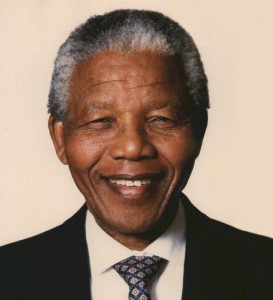Nelson Mandela’s 93rd birthday
Millions of South African schoolchildren have raised their voices in song to celebrate Nelson Mandela’s 93rd birthday, leading a worldwide chorus of birthday wishes for him.
More than 12 million students sang a special version of Happy Birthday before lessons began on Monday.
Mandela also received birthday wishes from South African leaders and from Barack Obama. In a statement, the US president called Mandela ‘a beacon for the global community, and for all who work for democracy, justice and reconciliation’.
Mandela, who has retired from public life, is expected to spend the day with his family in his home village of Qunu, approximately 600 miles (965km) south of Johannesburg.
People around the world have been asked to mark the occasion by giving 67 minutes of their time to work in their local community: one minute for every year of Mandela’s public service. He became South Africa’s first black president after spending 27 years in prison for his fight against apartheid. He was awarded a Nobel peace prize for his efforts.
For many South Africans, the elder statesman is also thought of as a beloved family member and referred to by his clan name, Madiba.
Students at the Johannesburg School for the Blind and Partially Sighted sang and danced on Monday morning as they wished their ‘Tata Mandela’ a happy birthday.
Most of the students are fire victims from South Africa’s impoverished townships and have received assistance from the Children of Fire charity.
This year, the charity held a mock trial at the school to illustrate Mandela’s role in fostering reconciliation after apartheid’s end.
After 27 years of enforced silence, Nelson Mandela emerged from prison in 1990 and proceeded to speak and write, becoming one of the most quoted people in the world.
He is also, according to Sello Hatang and Sahm Venter, the editors of Nelson Mandela – By Himself, one of the world’s most misquoted people too. This means the Nelson Mandela Foundation Centre of Memory is kept busy processing thousands of requests for quotations to be authenticated.
So Hatang and Venter trawled through thousands of public and private papers, speeches, letters, tapes, interviews, manuscripts and diary extracts going back as far as 1948 in a bid to produce an ‘authorised book of quotations’.
Probably the most famous comes from the speech he made from the dock during the Rivonia Trial in April 1964 -
“During my lifetime I have dedicated myself to this struggle of the African people. I have fought against white domination, and I have fought against black domination. I have cherished the ideal of a democratic and free society in which all persons live together in harmony and with equal opportunities. It is an ideal which I hope to live for and to achieve. But if needs be, it is an ideal for which I am prepared to die.”
Around 53 years before the birth of today’s birthday boy Nelson Mandela in 1918, Abraham Lincoln the 16th President of the United States was assassinated by Confederate sympathiser John Wilkes Booth at the Ford’s Theatre in Washington, D.C.
Consistently ranked by scholars as one of the greatest U.S. presidents of all time, Lincoln held firm through an enormous constitutional, military and moral crisis (the American Civil War) where he managed to preserve the Union while abolishing slavery and promoting economic and financial modernisation.
Born in 1809 in a one-room log cabin on the Sinking Spring Farm in southeast Hardin County, Kentucky, Lincoln was mostly self-educated.
He became a country lawyer – an Illinois state legislator – and a one-term member of the United States House of Representatives but failed in two attempts at a seat in the United States Senate.
After deftly opposing the expansion of slavery in the United States in his campaign debates and speeches, Lincoln secured the Republican nomination and was elected president in 1860.
Following declarations of secession by southern slave states, war began in April 1861.
Lincoln concentrated on both the military and political dimensions of the war effort, seeking to reunify the nation, which he did.
He issued his Emancipation Proclamation in 1863 and promoted the passage of the Thirteenth Amendment to the United States Constitution, abolishing slavery.
He was an affectionate, though often absent, husband and father of four children.
